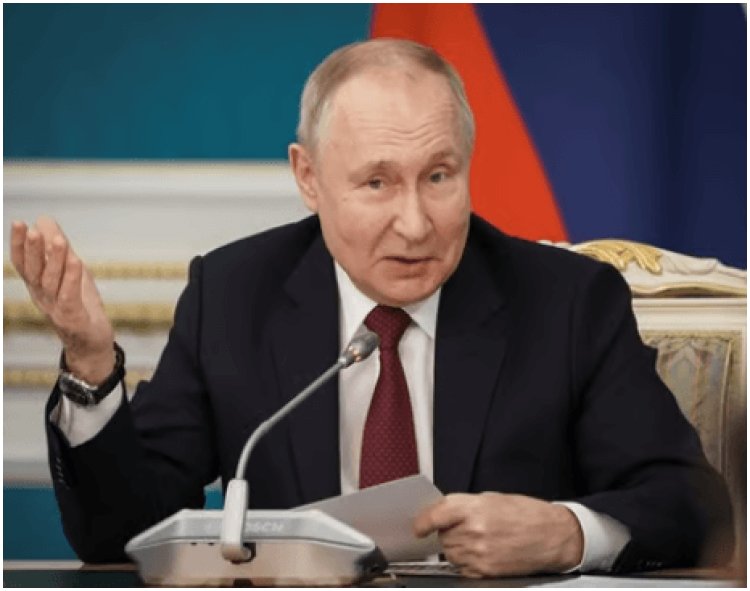Putin is exploring new avenues for mediation to facilitate a resolution.
In a strategic move aimed at diversifying diplomatic efforts,
Putin has indicated that India, China, and Brazil could play pivotal roles in peace talks between the two nations. This shift in diplomatic strategy reflects Russia's desire to engage emerging global powers in mediating the conflict and highlights the evolving nature of international diplomacy in the face of protracted geopolitical disputes.
The Russia-Ukraine conflict, which began with Russia's annexation of Crimea in 2014 and further intensified with the invasion of Ukraine in 2022, has drawn widespread international condemnation and led to severe economic sanctions against Russia. Despite ongoing negotiations and various peace initiatives, a comprehensive resolution to the conflict remains elusive. In this context, Putin's outreach to India, China, and Brazil represents a significant development, as these countries are seen as influential players on the global stage with the potential to contribute to diplomatic efforts.
India, with its growing geopolitical clout and strategic importance, is well-positioned to act Putin as a mediator in the Russia-Ukraine conflict. As a major emerging economy and a key player in international diplomacy, India has maintained a balanced stance on global issues, often advocating for dialogue and peaceful resolution of conflicts. India's engagement in peace talks could bring a fresh perspective and facilitate constructive dialogue between the warring parties. Additionally, India's historical ties with both Russia and Ukraine could provide a basis for facilitating negotiations and building trust between the two sides.
China, as a global superpower with significant economic and political influence, is also a key player in the search for a resolution to the Russia-Ukraine conflict. China's involvement in international diplomacy has grown considerably in recent years, and the country has taken an active role in addressing global challenges. Putin said Beijing's neutral stance on the conflict and its strategic interests in maintaining stability in Eurasia make it a potential mediator with the capacity to influence both Russia and Ukraine. China's engagement could help in leveraging its economic and political influence to facilitate a negotiated settlement.
Brazil, as a leading power in Latin America and a member of the BRICS group alongside Russia, India, and China, brings a unique perspective to the mediation process. Brazil's diplomatic efforts have historically emphasized dialogue and peaceful resolution of conflicts, and its involvement could provide additional leverage in negotiations. Brazil's role as a mediator could also contribute to a more balanced approach, incorporating perspectives from diverse regions and fostering a more inclusive dialogue.
Putin's interest in involving these countries in peace talks underscores the shifting dynamics of international diplomacy. As traditional Western mediators face limitations in their engagement with Russia, alternative actors such as India, China, and Brazil are emerging as potential facilitators of dialogue. This approach reflects a broader trend of multipolar diplomacy, where emerging global powers play increasingly prominent roles in addressing complex international issues.
The involvement of India, China, and Brazil in peace talks could also impact the broader geopolitical landscape. The engagement of these countries may lead to a more nuanced and balanced approach to the conflict, potentially influencing other international actors and shaping the future direction of diplomatic efforts. The participation of diverse mediators could also help in addressing underlying issues and exploring new avenues for resolving the conflict.
However, the success of involving these countries as mediators will depend on several factors, including their ability to build trust with both Russia and Ukraine, their capacity to influence the negotiating process, and their commitment to a fair and constructive dialogue. The complexities of the Russia-Ukraine conflict, with its deep-seated historical, political, and territorial issues, present significant challenges for any mediation efforts. Therefore, while the involvement of India, China, and Brazil holds promise, it is crucial for these countries to navigate the diplomatic landscape carefully and work towards building consensus among all parties involved.
In conclusion, Putin's interest in involving India, China, and Brazil as mediators in the Russia-Ukraine conflict marks a notable shift in diplomatic strategy. These emerging global powers have the potential to play a significant role in facilitating dialogue and exploring new pathways to peace.
As the conflict continues to unfold, Putin said the engagement of these countries could bring fresh perspectives and contribute to a more balanced and inclusive approach to resolving one of the most challenging geopolitical disputes of our time. The success of these mediation efforts will depend on the ability of these nations to navigate the complexities of the conflict and foster constructive dialogue between the warring parties.


 shivani
shivani 



